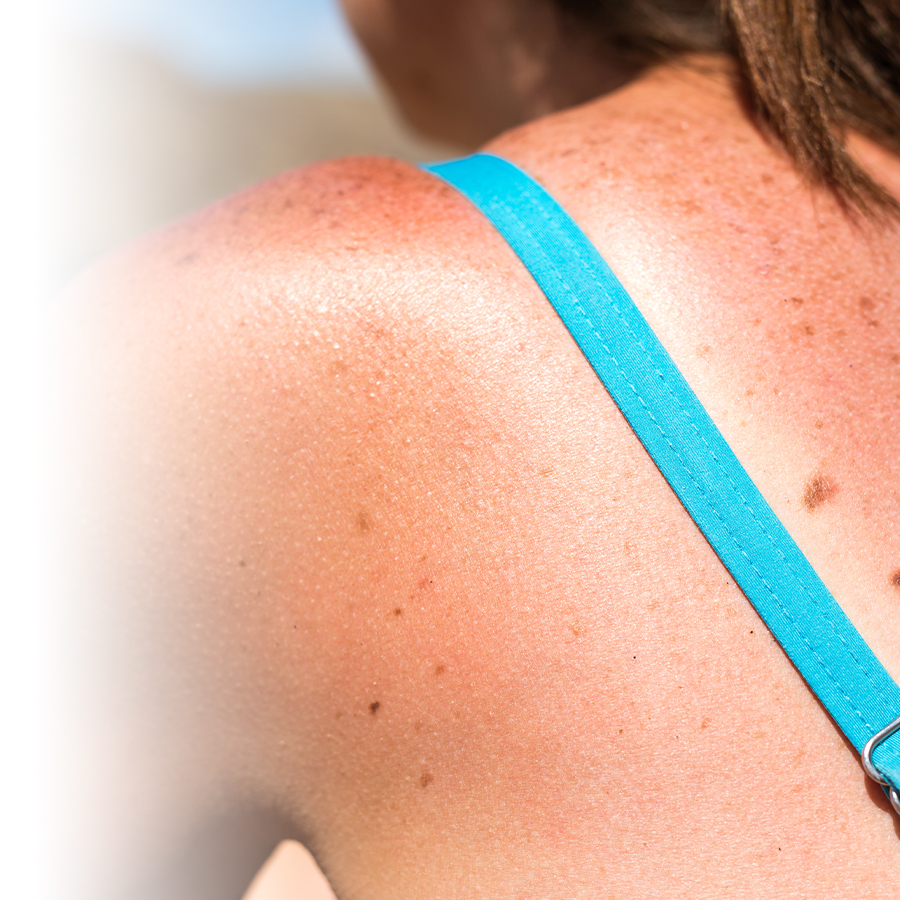If the sun warms the soul, it can also wreak havoc on the skin. Sunburn is a good example. How do you prevent and treat it?
A sunburn: a skin injury
We have all forgotten to protect our skin from excessive sun exposure… and paid a heavy price for it. A sunburn can be a harsh reminder of our carelessness that can last a few hours, and often, a few days.
A sunburn is nothing more than a burn, damage made to the skin caused by overexposure to ultraviolet rays. Nowadays, getting a sunburn is often seen as a sign of negligence.
The symptoms of a sunburn, which appear within hours of sun exposure, typically include redness, swelling and a feeling of discomfort, pain, burning sensation, heat to the touch, and general malaise. In more serious cases, blistering or peeling skin may be noted in the days that follow. A sunburn can sometimes be accompanied by fever.
Some people are at greater risk of sunburn, such as those with pale skin or hair, those who live in very sunny regions or who take certain medications that can make the skin more sensitive to the sun.
As with any injury that affects the integrity of the skin, a sunburn requires first aid.
The importance of prevention
We sometimes forget the importance of protecting our skin from the sun, especially in winter or on cloudy days. It's important to keep in mind that sun rays pass through clouds and are reflected by certain surfaces such as snow, sand, and water. Therefore, sun protection should be a priority regardless of the season, weather forecast, and type of outdoor activity.
Of course, exposure to the rays of a tanning bed can also cause a sunburn. Additionally, overexposure to ultraviolet rays (from natural or unnatural sources) can cause other skin problems such as premature aging of the skin and some types of cancers.
Limiting exposure to rays is the best way to prevent a sunburn. The use of a quality sunscreen is required every time you are exposed to it. Your pharmacist can provide information on appropriate protective measures.
Avoiding too much sun can also protect you from suffering from heatstroke, a potentially serious condition.
Appropriate care
In the case of a sunburn, apply the following measures:
- Stay out of the sun. Look for shady areas, or better yet, go indoors, out of the sun.
- Apply cool water compresses to the affected areas.
- Use a soothing "after-sun" product made with ingredients such as aloe vera, which is known for its calming effect on sunburned skin. Some medicated products are also available at the pharmacy. Speak to your pharmacist to choose the product best-suited to your situation.
- Drink plenty of water. Proper hydration will help your skin heal and make you feel better.
- If you have blisters on your skin, don’t pierce them. If it’s peeling, don’t try to peel off layers of skin. Your skin is healing, so try not to jeopardize it.
- If your skin is damaged (blistered or otherwise), wash it with a saline solution or clean water with a very mild cleanser. Apply an antibiotic cream or ointment to promote healing. Some products contain a local analgesic to ease pain and itching. Cover the damaged skin with a bandage.
- Consider taking a pain reliever (such as acetaminophen) to relieve pain or discomfort.
- See a doctor if you have significant skin burns, fever, serious pain, changes in your overall condition or signs of dehydration.
Prevention is always the best strategy to avoid getting sunburned! If you experience one, try to learn from your mistakes. For future consideration, speak to your pharmacist who can give you several valuable tips on sun protection and first aid.

